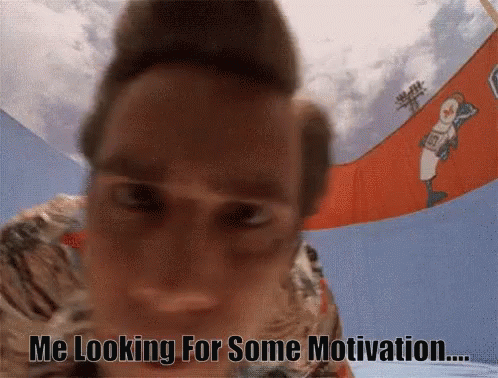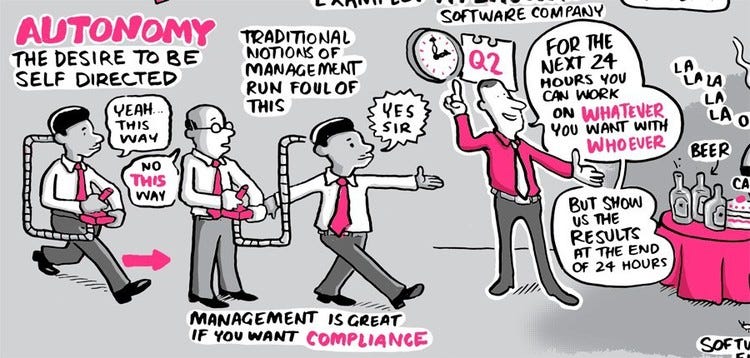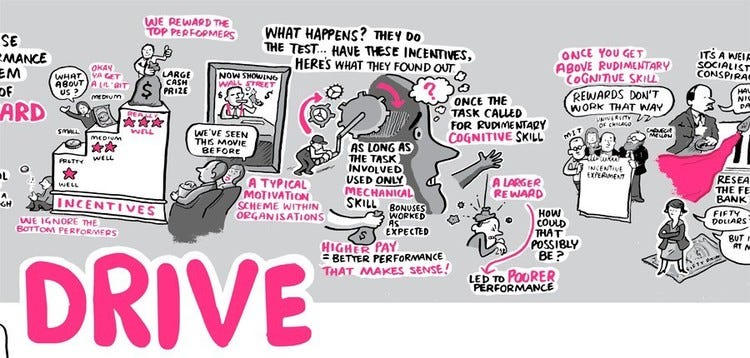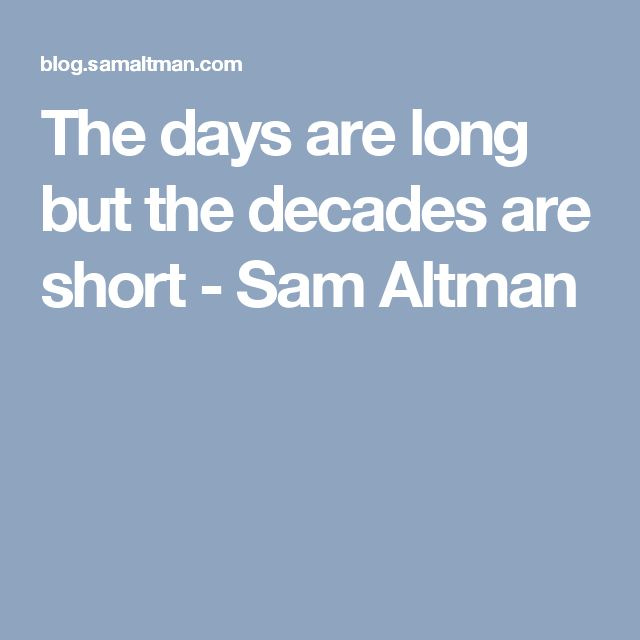What open source communities teach us about motivation
Can you intrinsically motivate people?
Hey there, community builders and fellow enthusiasts!
Today, let's dive deep into a topic that we all know is the lifeblood of any community: motivation. It's that magical ingredient that fuels our collective drive, helps us scale our community, and keeps its members engaged and inspired.
🔎 Will people participate” is a common question when discussing how to build a community.Community is a critical ingredient for building a self-perpetuating content generation engine such as a knowledge repository. Active contributions from the community is what makes such systems work. However, not everyone will want to contribute.
But wait, real question becomes what drives these rare individuals to contribute ( enough content to create a thriving and active community) ?
Having everyone or even a majority contribute is not the success criteria, however. The success is the growth of content and engagement with the content that users add.
Cast your mind back to the early days of the internet, where passionate individuals congregated in virtual spaces, sharing ideas, dreams, and ambitions.
People do what they do better when they know why they're doing it. Giving people just a simple reminder of why they're doing something can significantly improve performance.
Open source projects from Linux to Apache to the smallest open source ventures are very much grounded in all of these principles. People can choose the directions of their own lives, get feedback, and do it all with a sense of purpose. I ♥ the example of what drives folks to contribute for free to open-source communities (so be ready to get bored to understand the story behind why? )
"I really think that open source offers a lot of clues for how to run non-open-source companies better," Pink said. "It points us to a future that's going to be more efficient and better in every respect."
📚 Story hour (from my all-time Fav book)
Daniel Pink explains why people are motivated to do demanding cognitive work – such as software programming – for free. The science indicates that it has to do with our deep need for purpose, mastery, and autonomy that overshadows money as an incentive in certain situations.
🌐 Open Source and Internet Communities in Sync
🔍 Why "Open Source" is the most powerful business model of 21st century??
Go back to that encyclopedic showdown between Microsoft and Wikipedia. The assumptions at the heart of Motivation 2.0 suggest that such a result shouldn’t even be possible. Wikipedia’s triumph seems to defy the laws of behavioral physics.
Now, if this all-volunteer, all-amateur encyclopedia were the only instance of its kind, we might dismiss it as an aberration, an exception that proves the rule. But it’s not. Instead, Wikipedia represents the most powerful new business model of the twenty-first century: open source.
Fire up your home computer, for example. When you visit the Web to check the weather forecast or order some sneakers, you might be using Firefox, a free open-source Web browser created almost exclusively by volunteers around the world. Unpaid laborers who give away their product? That couldn’t be sustainable. The incentives are all wrong. Yet Firefox now has more than 150 million users.
Or walk into the IT department of a large company anywhere in the world and ask for a tour. That company’s corporate computer servers could well run on Linux, software devised by an army of unpaid programmers and available for free. Linux now powers one in four corporate servers. [ Then ask an employee to explain how the company’s website works. Humming beneath the site is probably Apache, free open-source Web server software created and maintained by a far-flung global group of volunteers. Apache’s share of the corporate Web server market: 52 percent.
In other words, companies that typically rely on external rewards to manage their employees run some of their most important systems with products created by nonemployees who don’t seem to need such rewards. And it’s not just the tens of thousands of software projects across the globe.
Today you can find: open-source cookbooks; open-source textbooks; open-source car design; open-source medical research; open-source legal briefs; open-source stock photography; open-source prosthetics; open-source credit unions; open-source cola; and for those for whom soft drinks won’t suffice, open-source beer. This new way of organizing what we do doesn’t banish extrinsic rewards.
But ultimately, open source depends on intrinsic motivation with the same ferocity that older business models rely on extrinsic motivation.
~Extracts from "Drive" by Daniel Pink🤔 How is it members of open source organizations do such incredible and thorough work with their software -- for no compensation at all?Daniel Pink pondered this question, calling in the best of motivational thinking of the era, and comes to this startling conclusion: monetary rewards motivate as they should for low-level mechanical tasks, but have the opposite effect on high-level cognitive tasks. Something much greater is at work.
💵 "Pay people enough to get the issue of money off the table," Pink says. But the ultimate motivation that accomplishes great things is autonomy, mastery, and purpose, and, unfortunately, "traditional notions of management run afoul of that."
👩💻The open-source phenomenon is the best illustration of the drive to mastery and purpose, Pink explains. "You get a bunch of people from around the world, who are doing highly skilled work, but they're willing to do it for free. They volunteer their time, up to 20 hours a week, and then what they create, they give it away rather than sell it."A captivating and easy-to-follow whiteboard talk, adapted from Dan Pink's talk at the RSA conference, illustrates the hidden truths behind what really motivates us at home and in the workplace. Some folks call this the "coolest presentation ever."
⚖️ The open-source economic model defies the laws of economics and our conventional wisdom about motivation, would have been laughed at 20 or 30 years ago, but is currently reshaping information technology."You have Linux, powering more than one out of four corporate servers in Fortune 500 companies. Apache, powering more than the majority of Web servers, Wikipedia. Wht are people dong this? Why are these people, many of whom are technically sophisticated. They have jobs, they're working at their jobs for pay. They're doing challenging and sophisticated work. And yet, during their limited discretionary time, they do equally but more purpose-driven work -- not for their employer, but for someone else for free. That's a strange economic behavior."
The motivation is challenge and mastery, Pink says:
"Along with making a contribution, there's the purpose motive. More and more organizations want to have some of transcendent purpose. Partly because that's the way to work better, partly because that's the way to get better talent."
And sticking to the old carrot-and-stick model of motivation is a failure in today's marketplace, he says:
"When the profit motive gets unmoored from the purpose motive, bad things happen... bad things ethically sometimes. It results in crappy products, lame services, and just uninspired places to work. When the profit motive becomes unhitched from the purpose motive, people just don't do great things."
The organizations that are flourishing are animated by the purpose motive," Pink points out. That makes people enjoy going to work every day. For examples, look at Skype, "which has the goal is to be disruptive but for the cause of making the world a better place," and Apple, where Steve Jobs vowed to "put a 'ding' in the universe."
"If we start treating people like people, and not assuming they're simply horses -- slower, smaller better-smelling horses," Pink says. "If we get past this ideology of carrot and sticks, we have the promise to make our world just a little bit better."
✍️ Open source communities provide us with invaluable lessons about the power of motivation. By embracing autonomy, nurturing mastery, instilling a sense of purpose, and fostering collaboration, these communities create an environment where intrinsic motivation flourishes.
Think you know how to motivate people? Think again!
Can you intrinsically motivate people?
In discussing community leaders, there is often the question of whether they can motivate users to participate in the community. The answer is no because intrinsic motivation is something internal to each person.
1️⃣0️⃣0️⃣0️⃣ This gets back to fans ( 1000 true fans ). There are individuals that are already avid fans of communities, think of the developers that participate in hackathons, attend conferences, and organize events. They understand the power of people coming together to share knowledge, to help each other, and to learn new ideas that spur on even better ideas. They value human-based knowledge and the value they have received from participating in communities. They understand the WIIFM (known as “What’s In It For Me”).Participation is a tricky thing to get right. Too many people, it becomes messy. Too few, and it feels like a ghost town. It is a market dynamics problem, ideally you want to get the balance right between too much and too little involvement.
What you can do however is provide an environment that makes it natural and easy for those with the motivation to want to participate in the community.
Out of the box
Would love to hear what drives you ? for me, it’s this single quote 👇
📌 Take a moment to process this.
Long Days.
Short Decades.It’s a mathematical anomaly that captures life beautifully. When we look back at our decades, almost always we tend to envision these blocks of years as time periods in our lives that flew by.
Rarely do we come across someone who indicates that “my teenage years were very long” or “I was stuck all the time in my 20s.” More typically, the sentiment is the opposite: “I can’t believe where my 20s went,” or “My teenage years went in a jiffy.”
Sure, some years seem long. personal and/or professional anxiety can make extended periods of time tough, and often at times, insufferable. But how long do these extended periods of time actually last, when viewed through the prism of a decade?
And then let’s get to the days. In any given month, there are mornings that are long. There are nights that are long. And there are entire mornings and nights that are long. Pick your unit of reference and there will be times when that said unit of reference feels long, tough, and insufferable. But once again in the context of 3,650 days (10 years * 365 days), how many such units of reference can you remember that vividly felt long?
P.S. If you get math, you can get life.









Great post Sapna!
If we want to achieve something great in life then it's obvious one needs to face so many struggles inorder to acheive it. Now, how a person can do that? Only if he is intrinsically motivated he will be able to navigate the challenges whereas if a person is extrinsically motivated then he/she tends to give it up at some point in their journey.
Interestingly if you look at Berkshire Hathaway investment portfolio over the years they've invested in businesses where the owners have taken a less personal salary for them.
“Everywhere there is a large commission, there is a high probability of a rip-off.”
~ Charlie Munger